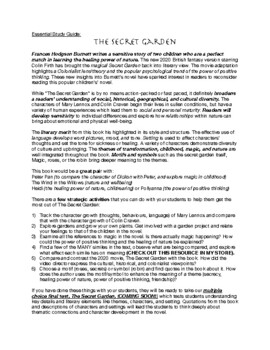- PDF
Description
Have you seen the new 2020 fantasy THE SECRET GARDEN?? It's phenomenal, magical, and deeply sensitive! The theatrical colonialist adaptation leads readers back to the original novel by Frances Hodgson Burnett.
It's an easy read for young and old, highlighting the healing power of nature, the power of positive thinking, and the importance of setting to spur character growth.
Get back to reading THE SECRET GARDEN using this essentials-packed study guide! This can be used as the basis for your own novel study unit, in literature circles, or as an independent study guideline.
One of the recommended study activities is finding, comparing, and learning from the many SIMILES in the novel. Check out this great LITERATURE LITERACY exercise whether your students have or have not read The Secret Garden.
After reading the book, administer THE SECRET GARDEN multiple choice test.
We hope your students continue to become Simply Great Readers!
Check out our other FREE ESSENTIAL STUDY GUIDES:


